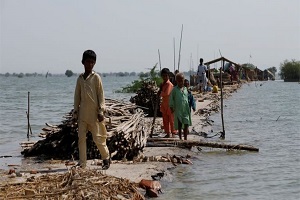
By Neelam Rahim
Officials say that water levels in Pakistan’s biggest lake are beginning to recede after last-ditch attempts to stop it from bursting its banks.
Manchar Lake, in Sindh province, is dangerously full after record monsoons that inundated a third of Pakistan.
Its banks were deliberately breached to shield surrounding areas, and over 100,000 people have been displaced.
Officials are racing against the clock to rescue and evacuate thousands of villagers still stranded.
“We see the water is now beginning to come down,” provincial minister Jam Khan Shoro told the BBC. “If we didn’t make the breaches, several towns with big populations would have been destroyed and plenty of more people at risk.”
Floods in Pakistan have affected some 33 million people and caused at least 1,343 deaths, Pakistan’s National Disaster Management Agency said.
Officials have said a little over a quarter of a million people are in shelters, a fraction of those who need help.
Damaged infrastructure is additionally hampering aid and rescue operations, which cannot keep pace with demand. Some connecting roads in Sindh province have collapsed, flooded, or backed up for days with queuing traffic.
Pakistan is facing one of its worst climate-induced natural disasters in years, as record torrential rainfall and melting glaciers within the country’s northern mountains have caused devastating floods.
Meanwhile, the UN children’s agency UNICEF has said more children are in danger of dying from the disease in Pakistan due to the shortage of clean water.
The disaster has also highlighted the stark disparity between countries that are the most significant contributors to climate change and nations that bear the brunt of its impact.
Pakistan produces less than 1% of worldwide greenhouse gas emissions, but its geography makes it highly prone to temperature change.
Source: BBC News







0 Comments